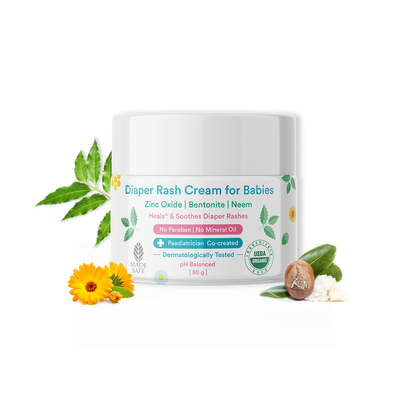
5 Ingredients To Avoid In A Baby’s Diaper Rash Cream
12 Sep 2022 | 3 min Read
Sayani Basu
Author | 607 Articles
Diaper rash is a common skin concern for babies and is often related to wet or infrequently changed diapers, chafing and skin sensitivity. It can cause red splotches and scales to appear in the genital area and on the baby’s bottom. A common form of inflamed skin (dermatitis), the rashes might sometimes spread up the little one’s legs and to the stomach.
A diaper rash cream acts as a moisturiser to treat or prevent dry, rough, scaly, itchy skin and minor skin irritations. However, there are certain ingredients to avoid in a baby’s diaper rash cream while choosing a diaper rash cream for your baby. It is often recommended to choose a diaper rash cream that has been formulated using natural ingredients.
Here are some of the nasties in diaper rash creams that should be avoided.
5 Nasties In Diaper Rash Creams
- Phenoxyethanol: Phenoxyethanol is a common preservative that has been found to trigger eczema, allergic reactions like hives and skin irritations.
It also has some other negative impacts on the nervous system and should not be present in your baby’s diaper rashes as it can be harmful to the little one when absorbed into the skin.
- Paraben Preservatives: The presence of paraben in your baby’s diaper rash cream can lead to acute and chronic side effects. It might also cause allergic reactions, hormone disruption, along with developmental toxicity.
It has also been reported that paraben can trigger excessive weight gain in babies when penetrated the little one’s skin.
- Synthetic fragrances: It is advisable to avoid diaper rash creams containing synthetic fragrances as these might disrupt your baby’s hormonal system when absorbed in the skin.
It also contains hormone-disrupting phthalates and can also lead to uneven breathing and asthma in babies.
- Mineral oil: A cheap petroleum by-product, mineral oil is used in several diaper creams.
It is recommended to look out for mineral oil in your baby’s diaper rash creams as it acts as a coating on the little one’s skin and blocks the pores and the skin’s natural breathing process.
- Petroleum jelly: Made from lanolin, petroleum jelly (also called petrolatum) is a mixture of mineral oils and waxes and forms a semisolid jelly-like substance that can worsen your baby’s diaper rashes and lead to fungal or bacterial infections.
Therefore, it is recommended to avoid opting for a diaper rash cream for your baby containing petroleum jelly.
Now that you have an idea of the nasties in diaper rash creams that worsen your baby’s diaper rashes, make sure you read the label before you pick a diaper rash cream for your baby.
Cover Image Credit: pexels
A


Related Topics for you
Suggestions offered by doctors on BabyChakra are of advisory nature i.e., for educational and informational purposes only. Content posted on, created for, or compiled by BabyChakra is not intended or designed to replace your doctor's independent judgment about any symptom, condition, or the appropriateness or risks of a procedure or treatment for a given person.

